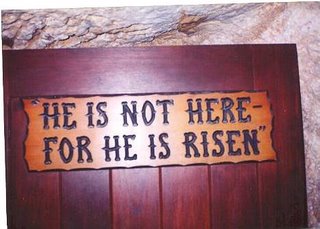
The Garden Tomb in Jerusalem

It is empty!

Grief
I stood insensate in the rain before
a heartless stone that sealed and tombed my Lord,
until a shining voice of white-hot power
echoed: “Stand aside!” I hardly heard.
I still stood, in a puddle tinted red
below a bleeding sunrise, when the rush
of molten feathers brushed and burnt my hand,
a silver swordflat felled me with a touch.
Someone stood near, flowing with a distant
speed of galaxies, and heaved the stone
to roll the sorrow open. Then the instant
passed in white light, like a flash, the tomb
stood open, gaping black impotent Death,
and Someone stood—was it the gardener?—and breathed.
~ Admonit
Thanks to Pastor Tom for inspiring this poem.
1 comment:
I liked "the rush of molten feathers brushed and burnt my hand" -- all kinds of reminders of Scriptural imagery (Isaiah's angels and burning coal, the "One like a son of man" in Revelation 1, etc). Also "a silver swordflat felled me with a touch" brought to mind the image of one being commissioned for some worthy calling, as a knight is dubbed with a gentle touch of a sword on each shoulder. And I like the last line -- the way it's interrupted, replicating how the narrator's breath must have been taken away.
What doesn't work for me is the voice. A first person recounting of an event that happened. It seems too clichéd, somehow, and too straight-foward. The kind of poem that Scott Cairns would say isn't poetic; it's only referential. I couldn't sense it generating anything more, apart from the two reminders of images I mentioned above. Maybe that's because of my lack of imagination, but that was my response to it.
Here's another classic Easter poem, one of my all-time favorite poems:
Seven Stanzas at Easter
John Updike
Make no mistake; if He rose at all it was as His body;
if the cells’ dissolution did not reverse,
the molecules reknit,
the amino acids rekindle,
the Church will fall.
It was not as the flowers,
each soft Spring recurrent;
it was not as His Spirit in the mouths and fuddled
eyes of the eleven apostles;
it was as His flesh: ours.
The same hinged thumbs and toes,
the same valved heart
that–pierced–died, withered, paused, and then
regathered out of enduring might
new strength to enclose.
Let us not mock God with metaphor,
analogy, sidestepping, transcendence;
making of the event a parable, a sign painted
in the faded credulity of earlier ages;
let us walk through the door.
The stone is rolled back, not papier-mâché,
not a stone in a story,
but the vast rock of materiality that in the slow
grinding of time will eclipse for each of us
the wide light of day.
And if we will have an angel at the tomb,
make it a real angel
weighty with Max Planck's quanta, vivid with hair,
opaque in the dawn light,
robed in real linen spun on a definite loom.
Let us not seek to make it less monstrous,
for our own convenience, our own sense of beauty,
lest, awakened in one unthinkable hour, we are
embarrassed by the miracle
and crushed by remonstrance.
Post a Comment